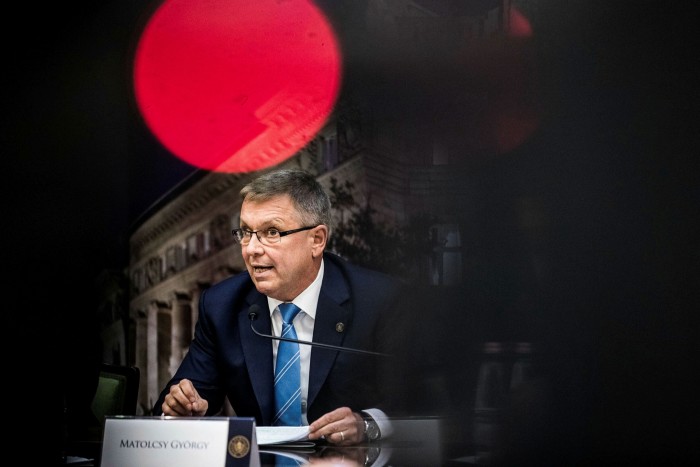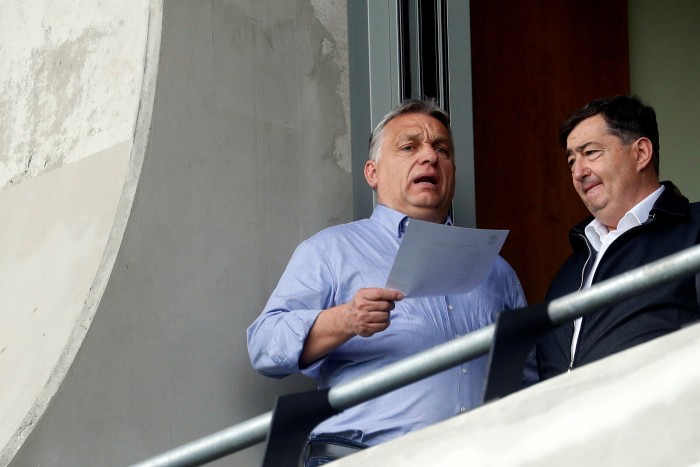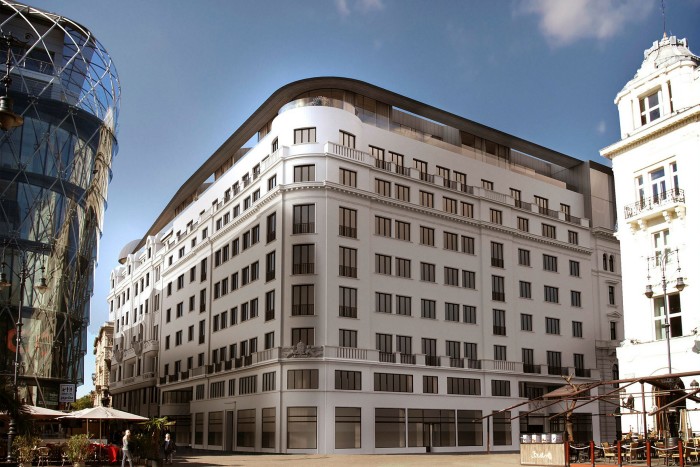The Bank of Viktor Orbán
A cold early April wind blew over Budapest as Hungary’s illiberal leader stepped on stage for an election victory speech. Having secured his fourth successive landslide, Viktor Orbán was jubilant as he addressed a small crowd of party faithful outside the Whale, a swanky fish-shaped convention centre by the Danube.
“We sure are in good shape,” he said to laughter and applause. “We won so big you can see it from the Moon.”
Nearby, a group of bankers with close links to the prime minister’s elite circle was similarly relieved. Orbán, Europe’s longest-serving government leader, for years had backed their effort to merge three of the country’s largest banks into a single institution, hoping it would serve his political goals as much as customers. His victory meant the Hungarian Bankholding project would definitely go forward.
Indeed, it was already under way. That same night, the merger took its first steps. Election night was chosen as the moment when some of the systems of the first two members, Budapest Bank and MKB Bank, would merge. Takarékbank, the third partner, is forecast to join in 2023.
The fusion went smoothly, systems were up and running. And Orbán was secure in office for at least another four years: maybe enough time for the so-called “superbank” to mature. Hungarian Bankholding was coming to life, intended to give Orbán’s political system a sturdy financial backbone.
When Orban’s took power in 2010, his party Fidesz said it would govern under a “National System of Cooperation” (NER) under which all members of society would pull together in pursuit of common goals. In practice, the NER has gradually become a network of state institutions and select businesses, typically run by Orban’s friends and allies, that rights groups say aid each other to prop up the prime minister’s illiberal regime.
EU leaders have accused Orban of channelling EU subsidies and public procurement contracts to this network in order to cultivate loyalty and cement his regime. His government denies this, but now faces a dearth of financing as the EU withholds €7.2bn worth of post-pandemic recovery funds over rule of law and corruption concerns.
A large private bank like Hungarian Bankholding could help stimulate Hungary’s economy. The government says the intention of the merger is to create a “strategically important” bank that will help make Hungary’s banking sector more secure and more efficient.
But a bank that co-operates closely with the government, and perhaps even takes instructions from it, would also fast-track the development of the hybrid economy that epitomises the NER system, top bankers say.
“Aside from direct profits and financing for their companies, what [Orbán and the government] covet most is influence,” says a banking executive who requested anonymity. “They want a large bank, which is great business, but it is also a power consideration,” says another financial sector executive. “It can help you finance the construction of the National System of Cooperation.”
In his three consecutive terms in office since 2010 Orbán created a nearly unbeatable political machine, which ensured electoral success. Now, he can pursue what bankers and others say is his desired legacy: ensuring economic and ideological supremacy, whoever is in power formally.
The Bankholding will help Orbán create a resilient local economic and social elite, say people familiar with his thinking. It could also help fulfil his nationalist agenda of weakening or pushing out foreign rivals, and even enable him to finance illiberal allies overseas. The French far-right party of Marine Le Pen was granted a loan by one of the banks that has merged to become Bankholding.

Bankholding did not respond to multiple requests for comment, but a Hungarian government spokesperson rejected the idea that the superbank would serve Orban’s agenda. The state’s ownership of only 30.35% of Bankholding means that “there is not and cannot be a political influence in its daily operation,” he says. It is “subject to the same rather strict legal framework and operating standards as any domestic bank.”
Therein lies the risk. One of the bank’s chief vulnerabilities, according to dozens of FT interviews with Hungarian finance professionals, is that its books are already loaded with loans for people beholden to Orbán’s regime. If Orbán fails, many of those companies stand to lose their fat state contracts and might default on their loans, in turn hitting the bank.
However, that does not necessarily mean a Hungarian superbank is a bad idea. Sources with close knowledge of its situation, who mostly spoke on condition of anonymity because of the sensitivity of the issue, said that a financial institution with capacity to lend more broadly could be a boon to the country’s economy — but only if it is free of political influence and permitted to outgrow its outsized exposure to Orbán’s system.
At the moment that seems unlikely. Alongside the state, the bank’s other owners are Orbán’s closest ally and childhood friend, Lőrinc Mészáros, with about 40 per cent; and an investor group with links to the son of central bank governor, György Matolcsy, another close Orbán ally.

As one source put it, until that changes, Hungarian Bankholding — whose members’ combined balance sheet in 2020 amounted to about one-sixth of the country’s GDP — “will be the single largest risk of the Hungarian economy.”
Building the superbank
Orbán has long been convinced that economic influence must underpin political power to make his regime enduring, a lesson he learned when his first stint as premier ended in defeat in 2002 despite a solid record of economic stewardship. When he returned to power in 2010 he set out to take control of the economy right out of the gate.
The banking system was then arguably in need of reform. Homegrown OTP Bank dominated a fragmented market with a share above 20 per cent. Subsidiaries of several foreign banks held around 10 per cent each, with a smattering of microlenders.
Most did not turn significant profits but parent companies kept them in their international networks anyway. “Nobody quit despite shocks and slow development,” said a banker with decades of experience on the Hungarian market. “That is, until Orbán came along.”
In his 2010 manifesto, Orbán turned the banks into scapegoats, pledging to fight back against mostly foreign-owned lenders, which he said overcharged Hungarians. “It is a system built to overpower while pretending to compete,” he wrote. “The state must step up against such situations. Where possible, cartel-like operations must be broken up, even by helping new competitors to enter.”
Orbán corrected a gaping fiscal hole with extra taxes on big businesses, mostly foreign-owned, including banks. Insolvency averted, he began to overhaul the entire sector. He cracked down on foreign currency lending, introduced further taxes on transactions — and, most importantly, moved to bring ownership into trusted domestic hands.

“We have set the goal to create a new economic system: a significant ambition,” Orbán told a business forum in the summer of 2012, signalling a departure from the western model of a social market economy. “Part of the new model is to have 50 per cent of the banking system in Hungarian hands.”
The premier wasted no time. A few months later, still in 2012, the state bought a big stake in Takarékbank, a savings and loan co-operative network, from Germany’s DZ Bank. In 2013, a capital hike increased that stake into a majority. In 2014, the state purchased MKB from Germany’s BayernLB. The following year, General Electric sold Budapest Bank to the government.
In 2016, the government reprivatised MKB and within 12 months one of Orbán’s closest friends snapped up a large chunk of it. Mészáros, a former pipe-fitter who grew up in the same village as the prime minister, had risen to become one of the country’s wealthiest individuals as his companies won scores of state procurement contracts. He once jovially attributed his meteoric rise to “God, good fortune and Viktor Orbán.”
Mészáros, who did not respond to a request for comment on this story, acquired big stakes not just in MKB but also in Takarékbank, in 2019. The components of the superbank were in loyal hands, in many ways the perfect conduit for the NER.
“The NER had several reasons to reshuffle the ownership structures of the bank sector,” said József Martin, director of Transparency International in Hungary. “They wanted to get rid of foreign capital, and pass the stakes on to pro-government business circles, ultimately to Mészáros.”
The stage was set and in December 2020, Hungarian Bankholding commenced operations as a holding company ahead of the planned merger.
The three lenders joining forces had very different profiles. MKB was strong in corporate loans and private banking. Budapest Bank was a modern universal bank with retail, corporate and investment services.
Takarékbank, meanwhile, was a patchwork of a modern core and Communist-era holdover rural savings co-operatives. Typical customers deposited modest savings, drawing cash once a month, loans were often based on back-of-an-envelope calculations and registered in chequered notebooks. It will be integrated later, possibly next year, Bankholding said.
Financing the empire
The merger is not yet complete but Bankholding’s books are already stacked with loans to Orban allies, friends and family members in the NER network, sources with direct knowledge of its operations say.
Although the precise extent of the NER exposure is unknown, some projects are public knowledge. Last August, Opus Energy, a subsidiary of Mészáros’s holding Opus Global, bought the eastern Hungarian electricity retail network Titász using a loan worth about €130mn from MKB Bank and Takarékbank, both Bankholding members, according to stock exchange filings.
In another example, BDPST, a real estate developer controlled by Orbán’s son-in-law István Tiborcz, received two Takarékbank loans worth a total of about €100mn last July to develop Hotel Dorothea, a luxury hotel under construction in the heart of Budapest, land registry documents show.

And another subsidiary of Tiborcz’s BDPST received about €14mn from Budapest Bank last September to buy the swanky downtown Iberostar Grand hotel, across the street from the central bank, according to the land registry.
Those three loans alone expanded the Hungarian Bankholding exposure to NER by nearly a quarter of a billion euros — more than 1 per cent of its cumulative balance sheet. Sources with direct knowledge of operations say many other large NER projects have also received loans from these banks.
A spokesperson for the National Bank of Hungary (NBH), the country’s central bank which also acts as market regulator, says Bankholding presents no “material additional vulnerabilities or prudential risks” beyond the risk profile of any financial institution. “In our view, the merger and full integration could greatly contribute to strengthening the [three banks’] risk management framework.”
Bankholding’s political influence also crosses borders. In March, with the merger looming, it emerged that MKB Bank had loaned more than €10mn to French nationalist presidential candidate Marine Le Pen, according to filings she made in Paris.
Orbán had supported her politics and met with her frequently in recent years, even appearing in a video message at her rallies. When Le Pen was unable to secure funding because of the longstanding reticence of French banks to associate with her far-right party, the Hungarian bank came to her aid.
That was a sort of loyalty test for Bankholding. According to two people with knowledge of the situation, Orbán’s direct order was necessary to extend the loan to Le Pen, something the bank’s management and even Mészáros were reluctant to do in such a sensitive political time. Eventually Orbán’s will prevailed and a Bankholding loan officer was sent to Paris to sign the paperwork with Le Pen, these sources said. The bank passed the test. Le Pen did not reply to repeated requests for comment.

Asked whether it would look into the Le Pen financing deal, the NBH told the Financial Times such control was outside its purview.
“According to EU law, market regulators are not allowed to track or authorise loans for individual customers . . . The [NBH] has no knowledge of such a transaction and is not examining it,” a spokesperson for the central bank said, adding that a political party was an appropriate customer if it presented proper collateral and guarantees.
There is evidence, however, that the central bank may have a conflict of interest when it comes to the superbank. Two companies, Blue Robin Investments and Magyar Takarék Holding, now control about 23 per cent of Bankholding, according to company documents. Both are owned by mutual funds managed by István Száraz, a business partner and close friend of Ádám Matolcsy, the central bank governor’s son.
The NBH spokesperson said in a statement that “the National Bank of Hungary strongly denies that the Governor of the central bank or any member of his family has any ownership relationship with Hungarian Bankholding. Any information to the contrary is a deliberate false rumour that is suitable to misleading readers.”
Systemic risk
The bank’s exposure to the NER network kept the entire banking sector on edge before the elections. Hungarian Bankholding was a legal reality, if not yet a fully merged company, and its combined market share and 21.4bn euro balance sheet, easily the second largest in the country, made it too big to fail. If the opposition won, they might have stripped Orban’s allies of their lucrative government contracts, leaving them unable to pay back loans.
But now that Orbán is safely back in office, the merger continues apace. “The Bankholding process is clearly irreversible by now, and the way it was conducted, channelling assets through the state, is completely unique in the western world,” says Martin of Transparency International. “It is an instrumental part of Orbánomics and the original capitalisation of that system.”

Nobody in the banking sector was willing to share their views on Bankholding on the record, for fear of angering the prime minister, but many say privately they feel angst at the systemic risks of the project. NER loans are expected to continue, trapping the enterprise in a phase where borrowers and owners are equally beholden to Orbán, said another senior banker, adding: “The world changes and those companies can fail.”
Others are more relaxed and say it can keep financing NER without serious problems. “If they get enough time, four to five years, then they may put it together and start making money with or without government favours,” one source said.
To some, however, there is a sense of missed opportunity at what this superbank could have done for Hungary. The Bankholding project “has many logical elements”, says another longtime banking leader. “Integrating the savings co-operatives is wise [and] merging retail, corporate and small business portfolios is smart. But they can hardly deal with that as they are busy financing the empire.”
Additional reporting by Leila Abboud in Paris

